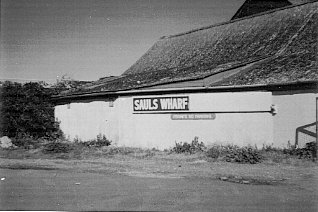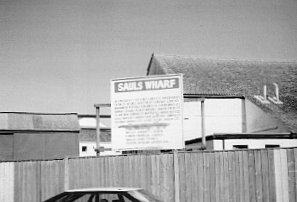

A Family Tradition
By Les Saul
This article was originally published in the December 2001 edition of Soul Search, the journal of The Sole Society.
Across Haven bridge on the west side of the Yare River, Steam Mill Lane runs north to the right to connect with Saw Mill Lane which, with Lady Haven road adjoining Cobham Close, encloses a group of waterfront buildings. There, two large signs proclaim Saul's Wharf, one of them listing the businesses which comprise this light industrial area.
It was here on Saw Mill Lane that the Saul timber merchants plied their trade for more than half a century. I could find no one working in this enclave at the time of my visit in 1995, who could point out just exactly where the Saul yard stood but judging by the only photograph I have, showing three generations of Saul men standing in a large sawdust-covered area amid piles of planed timber, it was an extensive holding. It was not hard to visualise wherries moored here on the waterfront, unloading wood brought up river from deepwater vessels in the North Sea for processing in this yard.
Thomas Saul, JP made quite a name for himself in the many years he did business in the Great Yarmouth area. A booklet comprising "Copies of Resolutions passed by the Town Council and Borough Justices of Great Yarmouth and Letters of Condolence received from the Members and Congregation of Park Church and other Public Bodies", dated at the time of his death, in March, 1905, attest to that. The Town Clerk refers to "the esteem in which he was held as a respected member of the Town Council...". The Mayor, Aldermen and Burgesses of the Borough of Great Yarmouth refer to "his many years as an energetic member of their body" as did the Borough Justices with whom he sat on the Bench. Rev. Westland Rose wrote on behalf of Park church and congregation and there was a letter from Norfolk Baptist Association in Cromer. The Great Yarmouth Liberal Club and the Southtown Ward Liberal Association expressed their regrets as did the Cobham Conservative Association and the Directors of the Yarmouth Independent. My father remembered his great grandfather as being a warm and kindly man.
Thomas Saul, sawyer, my great great grandfather, was born in Stalham, Norfolk in 1817, the son of a sawyer, William of Stalham born 1788 and grandson of John Saul of Stalham born in 1752, an agricultural labourer. Thomas's elder brother by two years, William Staff Saul had also taken up the trade and the two brothers left Norfolk for London to hone their skills, and there, William was married.
The brothers eventually returned to Norfolk and Kelly's business directory finds Thomas Saul established in 1874 on Saw Mill Lane as timber merchant of Southtown and "importer of deals and timber, dealing in flooring, matched boardings, mouldings etc., and steam sawing and planing mills". The company had stand No. 70 in the Norwich Corn hall. Nine years later in 1883, William S. is listed in Norwich, with son Arthur Saul, as "timber, deal and mahogany merchants" on St. Helen's Wood Wharf, Tabernacle Street. Arthur was my maternal grandfather and his eldest son, Stanley, would eventually take over the business.
 The
site of this timber yard is now a car park and uncommemorated. The Yarmouth
business expanded rapidly with branches established in Lowestoft and Beccles and
Thomas's eldest son, Thomas John, had joined the business in partnership with
his father.
The
site of this timber yard is now a car park and uncommemorated. The Yarmouth
business expanded rapidly with branches established in Lowestoft and Beccles and
Thomas's eldest son, Thomas John, had joined the business in partnership with
his father.
Thomas John died in 1913, only eight years after his father who had founded the business and although his eldest son did not take over, Thomas Saul and Son Ltd, timber merchants of Saw Mill Lane, continued under that name. In 1934 the site was listed under James Porter and Son.
 Coincidentally,
90 years after Thomas the sawyer established his business in Great Yarmouth, the
Saul name became associated with timber thousands of miles away. In 1965 when I
joined the Canadian government's department of Trade and Commerce, I was
assigned to the team responsible for selling Canadian timber to England and was
sent to London to promote the Canadian timber frame construction building system
and the demonstration housing estate called The Maples, at Harlow New Town.
Coincidentally,
90 years after Thomas the sawyer established his business in Great Yarmouth, the
Saul name became associated with timber thousands of miles away. In 1965 when I
joined the Canadian government's department of Trade and Commerce, I was
assigned to the team responsible for selling Canadian timber to England and was
sent to London to promote the Canadian timber frame construction building system
and the demonstration housing estate called The Maples, at Harlow New Town.
I would appreciate hearing from anyone who can amend or add to this brief history.